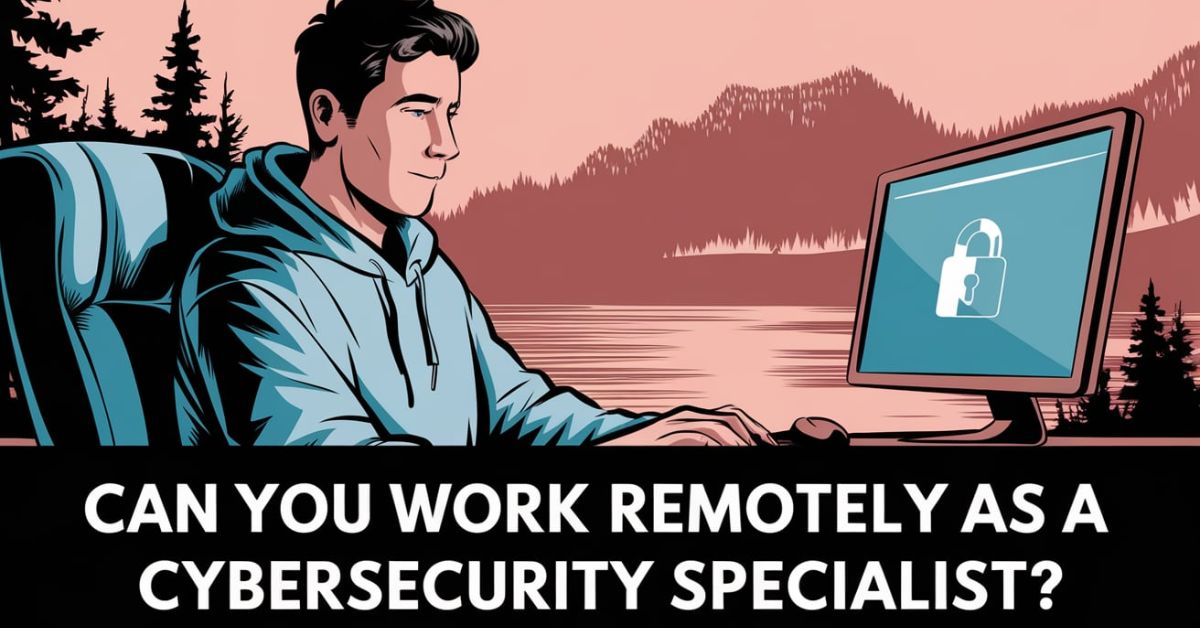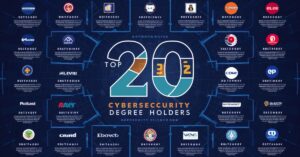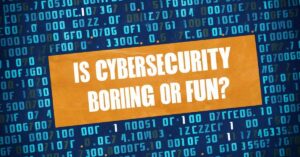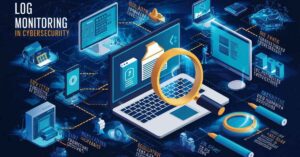In an era where data breaches make headlines and cyber threats lurk around every digital corner, cybersecurity specialists stand as the unsung heroes of our interconnected world. But here’s the million-dollar question: Can you work remotely as a cybersecurity specialist? Let’s dive into this digital rabbit hole and explore the exciting possibilities that await in the realm of remote cybersecurity careers.
Stay Informed With Our Weekly Newsletter
Before we plunge into the depths of remote cybersecurity work, why not sign up for our weekly newsletter? It’s packed with the latest industry trends, job opportunities, and expert insights. Don’t miss out on your chance to stay ahead of the curve in this rapidly evolving field!
Understanding the role of a remote cybersecurity specialist
Picture this: You’re sipping coffee in your favorite pajamas, fingers flying across the keyboard as you thwart a potential cyber attack. Sounds like a dream, right? Well, for many cybersecurity specialists, this is their daily reality.
Remote cybersecurity work has exploded in popularity, transforming the landscape of digital defense. But what exactly does a remote cybersecurity specialist do? Let’s break it down. Can You Work Remotely as a Cybersecurity Specialist?
Key responsibilities of a remote cybersecurity specialist
- Monitoring and analyzing security threats: Keep your eyes peeled for any suspicious activity in your organization’s networks.
- Implementing security measures: Deploy firewalls, encryption, and other protective measures to keep the bad guys out.
- Conducting vulnerability assessments: Identify weak spots in your systems before the hackers do.
- Responding to security incidents: When trouble strikes, you’re the digital firefighter putting out the flames.
- Educating employees: Teach your colleagues the art of not clicking on suspicious links (it’s harder than you’d think!).
Remote work adds an extra layer of complexity to these tasks. You’ll need to master the art of virtual collaboration, using tools like VPNs, cloud-based security platforms, and video conferencing software to stay connected with your team.
Required skills and qualifications
To thrive as a remote cybersecurity specialist, you’ll need a mix of technical prowess and soft skills. Here’s a quick rundown:
Technical skills:
- Network security
- Encryption technologies
- Ethical hacking
- Programming languages (Python, Java, C++)
- Cloud Security
Soft skills:
- Communication (written and verbal)
- Problem-solving
- Adaptability
- Self-motivation
- Time management
As for qualifications, most employers look for a bachelor’s degree in cybersecurity, computer science, or a related field. Certifications like CompTIA Security+, Certified Information Systems Security Professional (CISSP), and Certified Ethical Hacker (CEH) can give you an edge in the job market.
The rise of remote work in the tech industry

Remote work isn’t just a trend; it’s a full-blown revolution in the tech world. According to a 2021 survey by FlexJobs, 95% of respondents want to work remotely, either full-time or part-time. The cybersecurity sector is no exception to this shift.
Impact of the pandemic on remote work
COVID-19 acted as a catalyst, accelerating the adoption of remote work across industries. In the cybersecurity realm, this shift brought both opportunities and challenges. On one hand, it opened up a world of possibilities for professionals to work from anywhere. On the other, it created new security vulnerabilities as organizations scrambled to secure their newly distributed workforces.
Benefits and challenges of remote work
Working remotely as a cybersecurity specialist comes with its own set of pros and cons. Let’s weigh them up:
Benefits:
- Flexibility in work hours and location
- Reduced commute time and costs
- Improved work-life balance
- Access to a global job market
Challenges:
- Potential for isolation and burnout
- Need for self-discipline and time management
- Difficulty in separating work and personal life
- Possible security risks when handling sensitive data remotely
Trends shaping the future of remote work
The future of remote cybersecurity work looks bright, with several exciting trends on the horizon:
- AI and machine learning integration: These technologies will augment human expertise in threat detection and response.
- Zero Trust security models: As remote work becomes the norm, organizations are adopting more stringent security frameworks.
- Cloud-native security: With more businesses moving to the cloud, demand for cloud security specialists is skyrocketing.
- IoT security: As our homes and cities get smarter, so do the cybersecurity challenges.
Can you work remotely as a cybersecurity specialist near me?

You might be wondering, “Can I find remote cybersecurity jobs in my area?” The short answer is: absolutely! Many organizations offer hybrid models, allowing you to split your time between home and office. This can be an ideal setup, giving you the best of both worlds.
Entry-level cyber Security jobs work from home
Breaking into the cybersecurity field remotely might seem daunting, but it’s entirely possible. Here are some entry-level positions often available for remote work:
- Junior Security Analyst
- IT Support Specialist
- Network Administrator
- Security Operations Center (SOC) Analyst
To land these roles, focus on building a strong foundation in networking, security fundamentals, and relevant programming languages. Online courses, certifications, and personal projects can help you stand out in the competitive job market.
Remote Cyber Security jobs salary
Now, let’s talk money. Remote cybersecurity jobs often come with attractive salaries, reflecting the high demand for skilled professionals. Here’s a quick overview:
| Position | Average Salary Range (USD) |
|---|---|
| Entry-level | $60,000 – $80,000 |
| Mid-level | $80,000 – $120,000 |
| Senior-level | $120,000 – $200,000+ |
Keep in mind that these figures can vary based on factors like location, experience, and specific skills.
Cyber Security remote jobs worldwide
The beauty of remote work is that it opens up global opportunities. You could be living in New York while working for a company in Tokyo, or vice versa. However, working across time zones comes with its own set of challenges. Be prepared for flexible hours and the need to adapt to different cultural norms.
Are cyber security jobs remote Reddit
Reddit can be a goldmine of information on remote cybersecurity work. Many professionals share their experiences, tips, and job leads on subreddits like r/cybersecurity and r/netsec. One user shared:
“I’ve been working remotely in cybersecurity for 3 years now. It’s been a game-changer for my work-life balance. The key is to stay disciplined and keep your skills sharp.”
Cyber security jobs remote no experience
Breaking into cybersecurity with no experience can be challenging, but it’s not impossible. Here are some strategies:
- Build a home lab to practice your skills
- Contribute to open-source security projects
- Participate in bug bounty programs
- Network with professionals in the field
- Consider internships or apprenticeships that offer remote options
100% remote Cyber Security jobs
Fully remote cybersecurity positions are becoming increasingly common. Companies like GitLab, Elastic, and Automattic offer 100% remote roles in cybersecurity. These positions often require a high degree of self-motivation and excellent communication skills.
In Conclusion
So, can you work remotely as a cybersecurity specialist? The resounding answer is yes! The field of cybersecurity is evolving rapidly, and remote work is becoming increasingly prevalent. Whether you’re a seasoned pro or just starting, there’s never been a better time to explore remote opportunities in this exciting and crucial field.
FAQs
Q: Where can a cyber security specialist work?
Cybersecurity specialists can work in virtually any industry that relies on digital systems. This includes finance, healthcare, government, tech companies, and even non-profit organizations.
Q: What percent of cyber security jobs are remote?
While exact figures vary, a 2021 survey by ISACA found that 53% of cybersecurity professionals reported an increase in remote work options. This trend is expected to continue growing.
Q: What cyber security job is remote?
Many cybersecurity roles can be performed remotely, including:
- Information Security Analyst
- Penetration Tester
- Security Architect
- Incident Response Analyst
- Cloud Security Specialist
Q: Can I work in cyber security in another country?
Yes, many cybersecurity professionals work for companies based in other countries. However, be aware of potential legal and tax implications. Some roles may also require security clearances that are country-specific.








